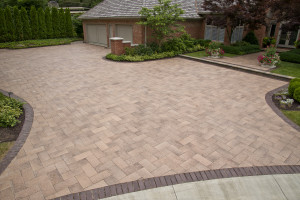 A popular home improvement project is the addition of a patio, sometimes known as an outdoor living space. One of the most popular and versatile choices for this type of project is pavers.
A popular home improvement project is the addition of a patio, sometimes known as an outdoor living space. One of the most popular and versatile choices for this type of project is pavers.
Unlike poured-in-place concrete, pavers are segmental. The advantages of using segments are that they have the potential to flex slightly under heavy loads, and they are much stronger on weak soils. This makes pavers an excellent choice for driveways, as well as many other types of hardscaping projects.
Pavers offer a diverse selection of design opportunities. Combinations of different patterns, colors, shapes, and textures now offer enough choices to customize the exterior “rooms” of your home as much as the interior. Additionally, with the expanding costs of natural stone paving, pavers also provide a more affordable option for consumers who want the look of natural stone without the price tag.
Careful preparation and proper installation are of the utmost importance when using pavers. The Interlocking Concrete Paver Institute (ICPI) is backed and operated by manufacturers and contractors from all across the world, and they publish best practices for installation while training thousands of installers each year. The best installers can become Certified Concrete Paver Installers (CCPI) after passing a rigorous test and having their experience verified by ICPI. If you’re interested, be sure to check out more information about pavers, certified installers, and all the recommended best practices.
When installed the right way, pavers can literally last a lifetime—and they’re a great way to create an attractive, functional hardscape on just about any property. While upfront installation costs can be higher for pavers than other surfaces, they provide excellent long-term value and benefits for your home, and require little maintenance. Most Certified Installers will offer a workmanship warranty, for at least two years, on the installation of the pavers. Engledow offers up to a ten-year workmanship warranty on our paver projects.
Another benefit of pavers is that in the rare event that a paver needs to be replaced, it can be—quickly and simply. Additionally, if buried utilities require repairs, pavers can be removed, stored, and re-installed after the repairs are complete.
In many areas, municipalities are beginning to regulate the use of non-permeable pavements to reduce the amount of storm water that’s flooding outdated storm sewers. A great solution is Permeable Interlocking Concrete Pavers (PICP). These pavers filter storm water run-off, detaining it underground. Depending upon the soil type at your site, some of this water may still be captured by sub-surface drainage pipes, but PICPs are considered a best practice for storm water management and they are now commonplace on LEED projects. Ask us if your project could benefit from a permeable paver installation.
As hardscape design has evolved over the past two decades, we’ve seen a steady increase in the use of pavers, and we recommend them for many projects—not only for their value, but also for their aesthetics. In fact, many homes with pavers have seen an increase in resale value.
If you have any questions about pavers or want to get started creating your own paver project, we can help. Contact us today to learn more about how we can design and build just about any paver installation you can dream of.

